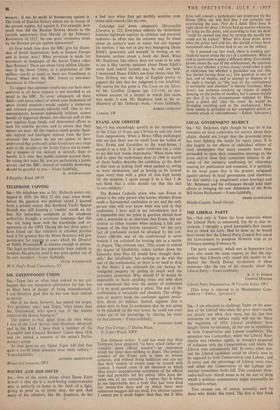EVANS AND CHRISTIE
SIR,—I was exceedingly careful in my introduction to the Trials of Evans and Christie to sort out facts from suppositions. When a Home Office pathologist tells me that there was no smell from the bodies of Mrs. Evans and Geraldine in the wash-house, I accept it as a fact. It is quite irrelevant for a critic to say this fact 'seems improbable.' When those who had to open the wash-house door in 1949 in search of those bodies describe the condition of the door at that time as locking itself when pushed to, owing to worn mechanism, and as havirig to be levered open every time with a piece of iron kept handy for the purpose, I again accept it as a fact. I do not think that a critic should say that this fact 'is very unlikely.'
The Roman Catholic priest who saw Evans in prison is the only person who knows whether Evans made a Sacramental confession or not and the only person who will ever know what was said in that confession. I have said in my introduction that it is impossible that the priest in question should have told a journalist in an interview that Evans 'did not confess to either murder when making a full con- fession of his sins before execution,' for the very fact of confession cannot be divulged by the con- fes§or an&itlie seal of the confessional is never broken. I am criticised for treating this as a matter of dogma. The criticism says, 'This seems to extend the dogma 'of infallibility rather further down the 'hierarchy than Pius IX would have thought desir- able.' But infallibility has nothing to do with the seal of the confessional, so there is no need to drag in Pio Nono. I am criticised for not having in- vestigated properly by getting in touch with the journalist concerned. Why should I? It would be impossible to learn anything from one who does not understand that over the matter of confession it is no good questioning a priest. The seal of the confessional is inviolable and absolute. The obliga- tion of secrecy binds the confessor against revela- tion, direct or indirect. Indeed, suppose that a priest were to hear in confession that he was going to be attacked on the way home, he could not even make use of his knowledge by altering his route on that account.—Yours faithfully,
St. John's Wood, NW 8
[Ian Gilmour writes : 'I said last week that Miss Tennyson Jesse appeared "to have relied rather un- critically upon official sources"—an impression which her letter does nothing to dispel. The police's conduct of the Evans case is open to serious criticism, and without being indelicate one can say that their version of events must be treated with caution. I named some of the instances in which Miss Jesse's unquestioning acceptance of the official view had probably led her astray. Miss Jesse dis- putes two of my examples. I repeat that it seems to me improbable that a body that had been dead for twenty-five days and on which there were numerous maggots did not smell. For obvious reasons I cannot put it much higher than that, but if Miss
Jesse will consult a pathologist not employed by the Home Office she will find that I am certainly not overstating the case. Nor do I think Miss Jesse is right about the door. Christie had no motive whatever for lying on this point, and according to him the door "could be opened and shut by turning the handle but could not be locked." When Miss Jesse wrote down what the police had told her, she should at least have mentioned what Christie had to say on the subject.
'As I pointed out last week, there is nothing par- ticularly secret about the fact of a confession. What is said at confession is quite a different thing. Everybody knows about the seal of the confessional; the question here is not whether a priest should reveal what is said at, confession but whether a particular one did. (He has denied having done so.) The question is one of fact, not of dogma, and to attempt to dispose of it by such a remark as "the seal of the confessional is inviolable and absolute" is merely frivolous. Miss" Jesse's last sentence conjures up visions of angels dancing on the points of needles, but I cannot myself see that if in the circumstances outlined by Miss Jesse a priest did `alter his route' he would be divulging anything said in the confessional. Miss Jesse seems. to postulate in her exemplary priest an extreme attack of schizophrenia.'—Editor, Spectator.]














































 Previous page
Previous page